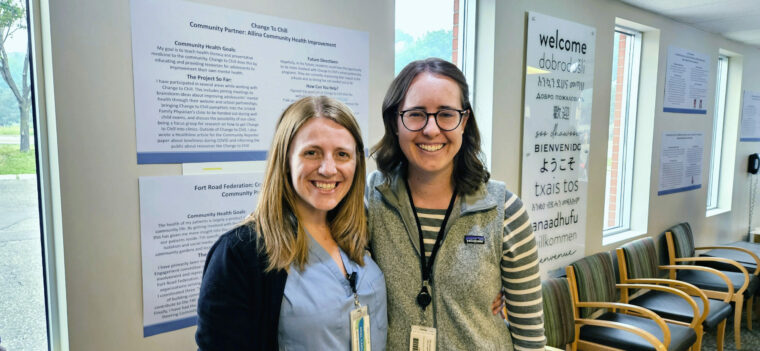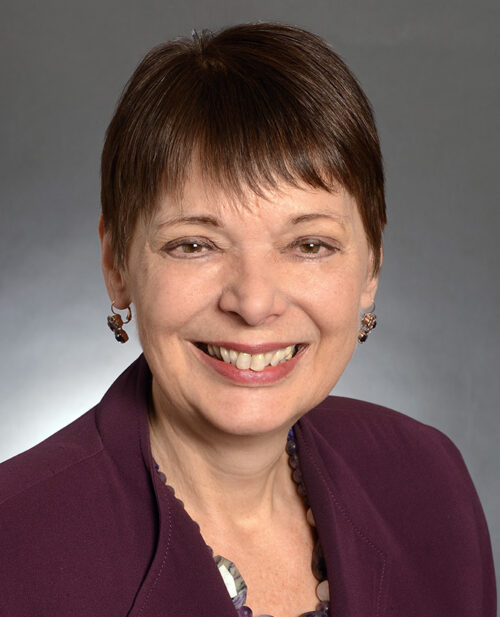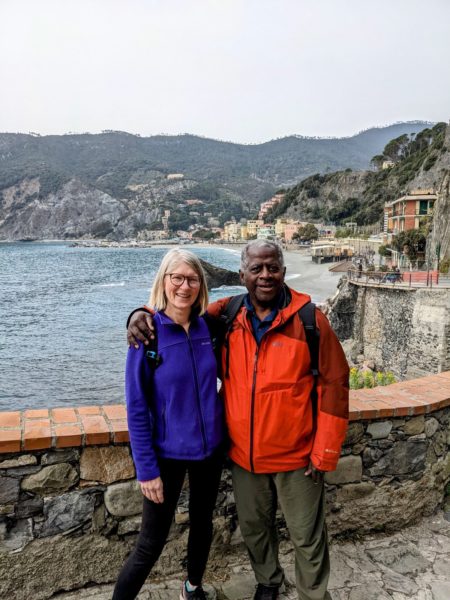United Family residents highlight work in the community
Residents with the Allina Health United Family Residency Program were able to share their community outreach projects for the first time since 2019 on June 14, 2023 at the United Family Physicians Clinic.
One of the hidden gems of the West End, each resident physician passing through the program works on a community engagement project meaningful to them that has an immeasurable positive impact on the community. The 21 residents were able to showcase the 16 projects they are working on to improve health outcomes in the community.
The scope and scale of the projects vary greatly, from getting to know members of the community to providing inpatient resources and care, and even research. Each resident brings their own passions when deciding what to work on.
Broader community engagement
Second-year resident Brooke Gensler, who has been working with the Fort Road Federation’s Outreach and Engagement Committee said she chose her project because of the long history United Family Physicians has in the West 7th Community.
“Something that drew me to this program was how strong the roots were in the community,” Gensler said. “I wanted a broader focus to get to know the community and see how we can bridge that connection between clinic, medical care and community.”
She said that she’s been working with members of the committee to better engage communities of color, renters and people on the older end of the age spectrum in the neighborhood, both for the clinic and to be involved in the work of the Federation. This includes more efforts to be inclusive of these committees at events.
“I put on a summer social last summer and we’re going to continue that this summer too, Gensler said. “Fairly simple, but I feel like that is where it starts.”
Addressing youth mental health
Fellow second-year resident Ashley Wittrock’s interest lies more with preventative medicine for young people. “I really like adolescents, young adults, because I think that is a really good time to teach people about health,” she said.
Wittrock said she chose to work with Change to Chill (changetochill.org), a service of Allina Health offering free, online mental health resources for teens. She said she has met regularly with them to find out how best to get their resources into the hands of those who need it.
“I was coming in like ‘I’m a physician who loves these resources. How do we get it into our clinic? What does that look like?’” she said.
What that looked like was providing informational literature at well child visits, writing a “Healthline” article for the Community Reporter and working toward being able to provide Change to Chill resources in schools. As the project progresses, it continues to evolve.
“Now my focus is how to get physicians’ ideas,” Wittrock said. “We are working on a focus group and some questions and that would be pulled back to our clinic.”
Advancing addiction medicine
Residents Brandi Portero and Amelia Underwood are both working on projects related to addiction medicine, but are coming at it from different angles.
Portero said she’s been working with RS EDEN, an organization providing housing, reentry and substance abuse services, by giving talks about healthcare to some of their residents.
“I was doing some work with teaching,” Portero said. “Like why you should care about primary care and going to a doctor and what that would look like.”
She has since started expanding her work to include other organizations reaching similar populations, like Recovery Cafe and Face to Face, focusing on providing resources to those in need, including medically assisted treatment for addiction (MAT).
“A lot of it is just people being educated about what are the resources,” Portero said. “Have our address, have our phone number and bring people in the door.”
Underwood said her project has been focused on people receiving inpatient services from Allina Health already, informing them of the resources available to them for addiction recovery through their family clinic, including MAT for addiction.
“Not every primary care office or primary care practitioner is comfortable with medically assisted treatment and that is something we do here,” Underwood said.
She said the goal of her project has been to work with other community organizations and clinics to increase the reach of MAT for opioid disorder and alcohol disorder by creating educational materials.
“When people are living with addiction, it takes many times engaging in some kind of care or engaging with someone who may offer resources or treatments before they are ready to engage,” Underwood said. “So the more people we educate about what’s available and the more broadly we offer our services or say we are doing this, the more times people hear it, the more likely they may be to engage.”
Underwood said she was working with Portero on the next phase of their projects to have an even bigger impact on their ability to reach people experiencing addiction in the community.
Primary Care for domestic violence survivors
Resident Katie Strandberg said her project is relatively recent, but no less impactful. She’s been partnering with Esperanza United, a nonprofit mobilizing Latinx communities to end gender-based violence, to provide healthcare resources to their residents.
“I’ve been working with the shelter manager and she has identified that a lot of the people who are staying there, understandably, have been faced with a lot of trauma in their lives and maybe their health hasn’t been on the forefront of what they are thinking about day-to-day,” said Strandberg. “But they get to a place that is more secure and stable and they are ready to start thinking about their health.”
Strandberg said this especially includes managing chronic diseases like hypertension and diabetes.
“So far I’ve put together a couple of resources, more educational based resources, based on hypertension, diabetes, ways that you might incorporate things that you might make certain food choices that would benefit those conditions as a starting place,” she said.
As a third-year resident, Strandberg will be graduating from the program soon, but said she hopes one of the incoming first-year residents will be interested in continuing her work on this project.
Medical career exploration
Third-year resident Emma Ostby said she, along with first-year resident Bobbi Livengood, have been sharing their expertise in the healthcare field through a program called “The Ladder,” allowing young people to explore careers in healthcare. They have partnered with Keystone Community Kids at the West 7th Community Center to provide monthly afterschool programming.
“We’ve been going there once a month, bringing healthcare related topics to them and talking about different careers within healthcare fields hoping to inspire some interest in pursuing these things in the future for them,” Ostby said.
The program offers a different topic each month for the young people to explore. Ostby said they try to offer a hands-on approach in their mentorship.
“We talked about the cardiovascular system, so we brought in a bunch of stethoscopes and listened to our hearts, and each other’s hearts and talked about blood pumping and what blood does and what the heart does and those sorts of things,” said Ostby. “We talked about lungs at one point. We talked about infectious disease and why you should get vaccines and wash your hands.”
Ostby said the program has existed in the Twin Cities in some iteration for about a decade. Right now, the program is reserved for youth participating in Keystone Community Kids, but she could see it being offered more widely in the future.
“For a future direction, we would like to open it up to more community folks. There might be folks beyond that programming that would be interested,” she said.
Providing home healthcare for people struggling with mental health
First-year resident Lydia Tortorici said that access to healthcare is one of her biggest passions, and her project works to provide access to those who aren’t able to access it in traditional ways. She is partnering with Radius Health, a local organization providing pharmacy services for people struggling with mental illness.
“We are partnering with them to try to get people that they think are appropriate enrolled into our clinic for home visits so we can expedite primary care that’s successful for people who are not great at making it into the clinic,” Tortorici said. “They would otherwise fall through the cracks.”
She said that, so far, she has done a ride along with them and starting to work on getting a workflow together. They have already started seeing a couple of patients.
“We have days blocked off on our schedule where we have a provider who goes out and sees people,” Tortorici said.
She is hoping that, long-term, the project will include approval from the internal review board and publishing research for other communities to implement similar strategies for providing care.
In the short-term, she is excited to get this project off the ground and into more people’s homes who would otherwise not be able to access healthcare.
“Just making sure that our work is valued and caring about every single person, even if they are not able to access our services the way we normally present them, is really important,” Tortorici said.




